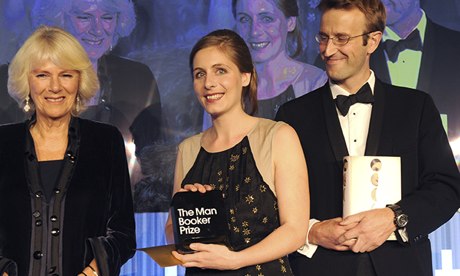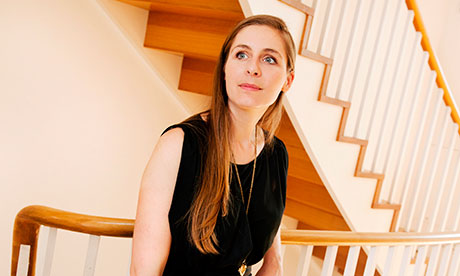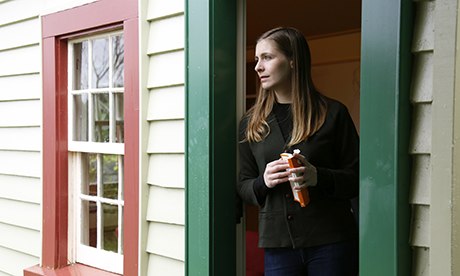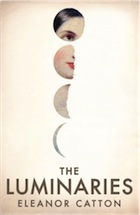 |
| Eleanor Catton: 'Interviews seldom engage with the woman as a serious thinker.' Photograph: Murdo Macleod for the Guardian |
Eleanor Catton: 'Male writers get asked what they think, women what they feel'
The 2013 Man Booker-prize winner on the unfair treatment of female writers and why her book The Luminaries riled male critics of a certaic age
Eleanor Catton's life swerved off its expected course almost exactly 12 hours before our meeting, the morning after her novel The Luminaries – a virtuoso work set amid the 1860s New Zealand gold rush – was named the winner of the 2013 Man Brooker prize.
When the moment came , the TV cameras showed a face as still as a marble sculpture, pinned into immobility by shock. Then she dove into her handbag and rootled through it until she found her acceptance speech, which she delivered in a clear but tremulous voice. "The superstitious part of me didn't want to make the speech too easy to find," she explains. "At the same time I knew I'd never be able to relax if I hadn't prepared something. At times of emotional intensity I need a script."
A person who radiates immense self-possession and quiet authority, she looks fresh and bright, despite only two-and-a-half hours' sleep; she cheerily attributes that to the fact that she hasn't taken off last night's makeup. She slept through her alarm, and more or less bundled herself into a cab for a breakfast-time radio interview, raking the previous night's pins from her hair as she did so.
Twelve hours ago Catton was a promising young writer, with two mostly well-received novels under her belt (the first, The Rehearsal, revolved around the figures on the periphery of a school sexual scandal). Now, she's a phenomenon. At 28, she's the youngest ever Man Booker-winning author with the longest-ever novel. She is only the second New Zealander to win it, after Keri Hulme, who was awarded it the year she was born. She has £50,000 in her pocket, and her book, having been a modest seller, has zoomed straight to the top of the Amazon sales ranking.
The win will mean, finally, a room of her own. At the moment she and her partner, the American poet Steven Toussaint, whom she met when they were both studying at the Iowa Writers's Workshop, rent a two-bedroom apartment in Auckland. While he works towards his PhD in poetry, "He gets the study, that's the deal. So at the moment I don't have one. The idea of being able to move into a bigger place is extremely exciting."
With the prize also comes that mixed blessing, fame, and she's already bothered by the uneven treatment accorded to men and women in the public eye.
"I have observed that male writers tend to get asked what they think and women what they feel," she says. "In my experience, and that of a lot of other women writers, all of the questions coming at them from interviewers tend to be about how lucky they are to be where they are – about luck and identity and how the idea struck them. The interviews much more seldom engage with the woman as a serious thinker, a philosopher, as a person with preoccupations that are going to sustain them for their lifetime."
And then there is the question of her youth. Though generally well-received in Britain, The Luminaries, she said, was subject to a "bullying" reception from certain male reviewers of an older generation – particularly in her native New Zealand. "People whose negative reaction has been most vehement have all been men over about 45," she says.
"One of those things that you learn in school about any kind of bullying is that it's always more to do with them than it is to do with you. I don't see that my age has anything to do with what is between the covers of my book, any more than the fact that I am right-handed. It's a fact of my biography, but it's uninteresting."
It is the peculiar constellation of her age, gender and the particular nature of The Luminaries that has, she believes, provoked "a sense of irritation from some critics – that I have been so audacious to have taken up people's time by writing a long book. There's a sense in there of: 'Who do you think you are? You can't do that.' Something else related to that is to do with the omniscient third person narration of the book. There's a feeling of: 'All right, we can tolerate [this] from a man over 50, but we are not going to be spoken to like that by you.'"
The Luminaries is, at the plot level, a page-turning, suspenseful story about a series of unsolved crimes, written in the manner of a Victorian sensation novel. In January 1866, in the New Zealand gold-rush town of Hokitika, a Scot called Moody walks into a hotel smoking room to find 12 men ruminating on a series of mysterious events: the disappearance of a rich prospector, the death of a wealthy recluse, the beating to a pulp of a prostitute. All the men are connected to these events and bound to each other.
The novel has an entirely original organising principle: each chapter is preceded by an astrological chart and each character is associated with a heavenly body; the characters act in accordance with the actual movements of the cosmos as they were, starting on 27 January 1866. At the same time, the novel is organised in 12 parts, each half the length of the previous one – thus the novel itself wanes.
These principles may look tricksy or artificial when described rather than experienced but are not, says Catton, an "exoskeleton" – rather they are entirely bound up with the ideas of the book. "The paradox is," she says, "the relationship between, on the one hand, the characters being the masters of their fates, and on the other hand that being predetermined." She talks of the astrological structure as being akin to a structure a composer might work within, and mentions her interest in the book Gödel Escher Bach, which explores patterns and systems in the work of the mathematician, artist and composer.
"One of the most baffling things is when people assume that when something is structurally ornate it is less human than something that is not structurally ornate," she says. "That puzzles me – I feel as a person the most alive and human and full of wonder when I am contemplating complexities. The ability of humans to read meaning into patterns is the most defining characteristic we have."
It's the seriousness of Catton's work that strikes you when talking to her – her belief in the novel both as a "builder of empathy" and as a carrier of ideas. When I spoke to one of the Man Booker judges, critic Stuart Kelly, he said that it was her ability to "make the novel think in a way that the novel doesn't do normally" that set her apart; the way that, for example, she sets astrology and capitalism into play as competing systems of dealing with the world, but at the same time has produced "a rip-roaring read". "The prize went to the true avant-gardist," he said. "No novel has been like this before."
For Catton – the daughter of a philosopher and a librarian – the novel is a tool for thinking with, as well as feeling with. "It is in my view a much better vehicle for philosophy than syllogisms and logical constructs," she says.
"What I like about fiction most is that it resists closure and exists, if the reader is willing to engage, as a possible encounter - an encounter that is like meeting a human being."

Eleanor Catton becomes youngest Booker prize winner
Judges praise 832 'extraordinary' pages of The Luminaries that New Zealander began writing when she was 25

Eleanor Catton, centre, receives the Booker prize, with the Duchess of Cornwall, left, and the chair of the judges, Robert Macfarlane, right. Photograph: Anthony Devlin/AP
Eleanor Catton made Man Booker prize history twice on Tuesday night the youngest winner for, at 832 pages, the longest novel.
The New Zealander was 25 when she began writing The Luminaries, an epic 19th-century gold rush murder mystery. Now 28, she also becomes an "end of an era" winner: the last recipient of a Booker prize which, for 45 years, has only allowed Commonwealth and Irish writers – next year, the Americans are coming.
This year's chair of judges, the writer and critic Robert Macfarlane, admitted readers needed to make a "huge investment" in the doorstopping book; it is challenging with a slow start but the dividends were more than worth it.
"We have returned to it three times," he said. "We have dug into it and the yield it has offered at each new reading has been extraordinary."
Macfarlane said it took just under two hours for the judges to decide on the winner and there was no need for a vote. "There was pretty tough discussion, we put the novels to the test … and, at the end, we were all very happy."
It was a pleasant judging process, he said. "I don't want it to sound tranquil to the point of tranquillised because it wasn't that. We brought pressures to bear on the novels but it was a very happy process."
Catton's novel easily set a new longest winner record, beating Hilary Mantel's Wolf Hall, which was 672 pages long and AS Byatt's Possession, at 624 pages.
Catton became only the second New Zealander to win after Keri Hulme in 1985 for The Bone People. It was also the first win for the publisher, Granta.
The novel had been up against the shortest work ever to be shortlisted: Colm Toibin's 30,000 word novella The Last Testament of Mary and the bookies' favourite, Jim Crace's Harvest. Also missing out were Ruth Ozeki for A Tale for the Time Being; Jhumpa Lahiri for The Lowland and NoViolet Bulawayo for We Need New Names.


Catton takes the youngest winner title from Ben Okri who was 32 when The Famished Road won the Booker prize in 1991.
But Macfarlane praised the maturity of the work. "You read every sentence and you are astonished by its knowledge and its poise," he said. In a way, the winner is a classic Victorian novel with murder, red herrings, conspiracies and fallen women."
Catton said hearing she was the winner was like hitting "a white wall". She said: "I remember I'd written something down and it was in the depths of my handbag ... I've just bought a new handbag because my old one wasn't big enough to fit in my book.
"It's a curious thing about writing a novel: you never see it until it's finished. When I was nearing the end I started to get a sense that when I pressed save on my Word document it took an awfully long time. It wasn't until I got a proof of the book I thought 'jeepers this is quite big'."
A key theme of the book is astrology. Catton, a Libra, admitted she had not checked her horoscope but there was a significant astrological aspect to her winning, as the last New Zealander to win was 28 years ago, an important astrological number – "it is the time that Saturn takes to orbit around the Earth."
She joked: "I'm already sounding like a lunatic."
The Luminaries is Catton's second novel after The Rehearsal, which was shortlisted for the 2009 Guardian first book award.
The shortlist had been widely heralded as one of the strongest in years and was diverse in its subject matter and geographic span, from the English countryside to shanty town life in Zimbabwe.
But this year's prize has been overshadowed by the announcement of a controversial rule change. Since 1969, when PH Newby was named the first winner, the Booker has been open only to citizens of the Commonwealth and Ireland but next year it will be open to anyone writing fiction in English. In essence, it means that US writers will become eligible: it becomes much more competitive.
The decision has sparked a literary storm. Those against the changes include Crace, the 2011 winner Julian Barnes and Philip Hensher, who wrote in the Guardian: "It seems quite baffling to many writers that a major prize that has so successfully promoted them should move its terms so radically and for no good reason."
Hensher fears the Booker will become viewed as a minor American award, but the prize's chairman, Jonathan Taylor, said a failure to change the rules would be like not allowing China into the Olympics. Helena Kennedy, a Booker trustee, said the current rules were like having the border control agency involved.
The widespread and denied suspicion is that the decision is a response to the creation of the Folio Prize for fiction, open to all fiction works written in English.
Catton wins £50,000, which was presented by Camilla, the Duchess of Cornwall, at a black tie dinner in London's Guildhall.
Jon Howells, a spokesman for Waterstones, said another historical fiction was "great news for readers as this is a hugely enjoyable and compelling affair." It is also "potentially the biggest seller on the shortlist and will now benefit massively from the Booker boost".
The other judges this year were the biographer and critic Robert Douglas-Fairhurst, the writer and broadcaster Natalie Haynes, the BBC journalist Martha Kearney and the writer and critic Stuart Kelly.

Pity poor Eleanor Catton, winning the Man Booker prize so young
Failure is good for the soul – one should avoid peaking too early. At least that's what I tell myself as I contemplate the successful young

Eleanor Catton, the youngest-ever winner of the Man Booker prize, 'who is going to have to spend the rest of her life with a major achievement behind her'. Photograph: Maja Moritz/dpa/Corbis
In 1956 Samuel Beckett, then 50 years old, wrote to his American publisher about how he viewed his newfound fame, as Waiting for Godot suddenly gave him an audience that had hitherto been ignoring him for decades. "Success and failure on the public level never mattered much to me. In fact, I feel more at home with the latter, having breathed deep of its vivifying air all my writing life up to the last couple of years."
That's always been one of my favourite quotations: it advances the idea that success is somehow not good for one, and that failure is bracing and healthy for the soul. So we sympathise deeply with the unfortunate Eleanor Catton, who at 28 has become the youngest-ever winner of the Man Booker prize. What is more, she did it with an 800-plus-page book. I am fairly sure there are plenty of people who, by the age of 28, have not read 800 pages, let alone written them.
As I grew up, I did what I suspect is very widespread practice: I would note my own age, and compare it with the ages of people I aspired to be like. So when I first got into the Beatles, aged 12, I would say to myself: "Plenty of time yet," as I knew that I had 11 years before I needed to sign my first record deal (if we count from Lennon's age, not Harrison's). How foolish! Twenty-eight, McCartney's age when the Beatles split up, is now a dot in the rear-view mirror.
Contemplation of the successful young gets more depressing as we get older without achieving anything, apart from that time you won the girl's year nine discus event or, in my case, a year's free Puffin Club membership in 1974. It has all been downhill ever since and although – like all authors – I imagined, on the eve of my books' publications, that I would awake the next day to find myself, like Byron, famous, fame somehow remains elusive. (This happened to Byron after the publication of Childe Harold's Pilgrimage, when he was – eurgh – 24.)
The problem, I like to think, is peaking too early. One does not want to wear the batteries out. Well, that's what you say as the milestones fall. (Traditionally, the first one of these to topple is Jesus Christ, and everyone who has passed 33 has ruefully conceded that they have failed to establish a world religion by that age. At least God had the decency to wait until Muhammad was 40 before bestowing his visions upon him.)
We now tend to dwell on those who took a while to get cracking. Anton Bruckner was 48 before he composed a symphony he was happy with (and he was still tinkering with it 20 years later). Kenneth Grahame was 49 when he published The Wind in the Willows. Lowry didn't have his first London exhibition until the beginning of his sixth decade, which puts whippersnappers such as Damien Hirst and Tracey Emin in their place. Now round about the half-century mark themselves, they could be said, if the reviews and the evidence of my own eyes are anything to go by, to be entering the twilight of their careers. Get knocked down at that age and it becomes harder to get up again.
So let us salute the masters – or mistresses, if you prefer – of the art of starting late: Mary Wesley and Diana Athill, 70 and – amazingly – 83, respectively, before their careers really got going. There is also Professor Peter Higgs, a Nobel laureate at 84 (albeit for work he'd done 50 years earlier). Contemplate these most worthy and excellent examples, breathe deeply of the vivifying air of failure, and heap pity upon the likes of poor Eleanor Catton, who is going to have to spend the rest of her life with a major achievement behind her.






No comments:
Post a Comment